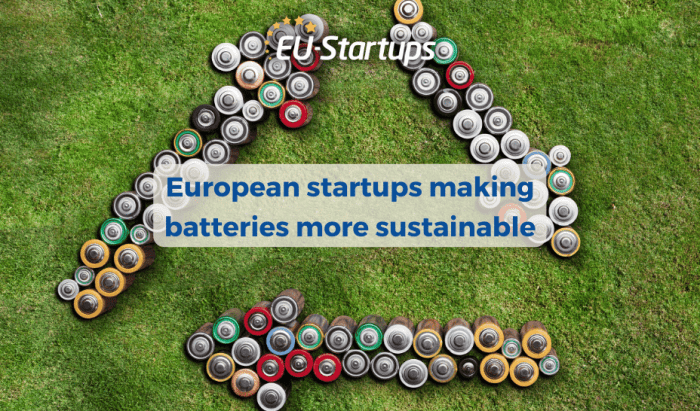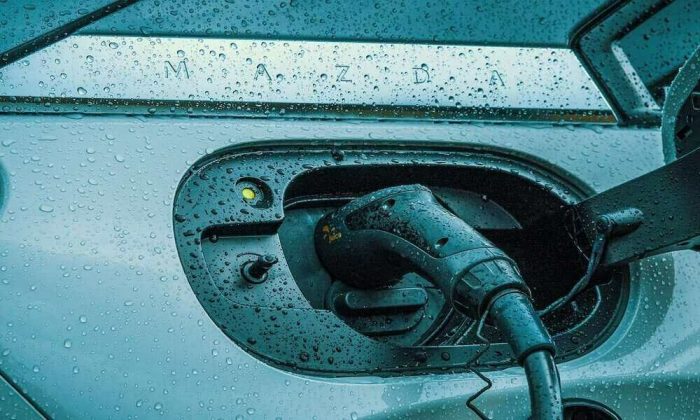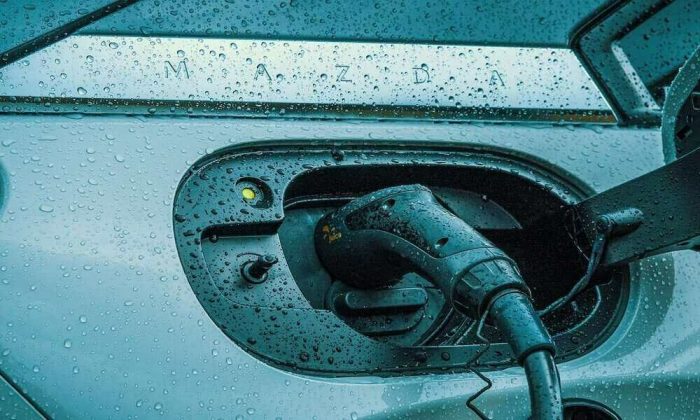European startups better battery – European startups are pushing the boundaries of battery technology, with a focus on developing innovative solutions for electric vehicles, consumer electronics, and energy storage. From solid-state batteries to lithium-sulfur and sodium-ion technologies, these startups are making waves in the industry.
But can they compete with established players in Asia and North America?
This article delves into the European battery startup landscape, exploring the key players, funding trends, and the challenges and opportunities they face. We’ll examine the latest breakthroughs in battery technology, analyze the potential economic impact, and discuss the importance of sustainability and recycling in this burgeoning sector.
The European Startup Landscape for Battery Technology: European Startups Better Battery
Europe is experiencing a surge in battery technology startups, driven by the increasing demand for electric vehicles, renewable energy storage, and portable electronics. These startups are developing innovative solutions to address the challenges of battery performance, cost, and sustainability.
Key Players in the European Battery Startup Ecosystem
The European battery startup ecosystem is home to a diverse range of companies developing innovative technologies across various battery segments. Some of the key players include:
- Northvolt (Sweden):Focused on large-scale battery production for electric vehicles and grid storage, Northvolt has secured significant funding and partnerships, aiming to establish a strong European battery supply chain.
- FREYR Battery (Norway):Developing sustainable and environmentally friendly battery production methods, FREYR Battery targets the growing demand for batteries in renewable energy applications.
- Verkor (France):Aiming to create a European battery gigafactory, Verkor focuses on developing high-performance batteries for electric vehicles and industrial applications.
- Britishvolt (UK):Developing a large-scale battery gigafactory in the UK, Britishvolt targets the automotive and energy storage sectors.
- InoBat (Slovakia):Specializing in the development of high-performance and sustainable lithium-ion batteries, InoBat offers customized solutions for various applications.
Funding Landscape for European Battery Startups
European battery startups are attracting significant investment from venture capitalists, governments, and corporations. The funding landscape is characterized by:
- Growing Venture Capital Investment:Venture capitalists are increasingly investing in battery technology startups, recognizing the potential for high returns in this rapidly growing market.
- Government Support:Governments across Europe are providing grants, subsidies, and tax incentives to support the development of battery technology and the creation of a domestic battery industry.
- Strategic Partnerships:Battery startups are forging strategic partnerships with established automotive manufacturers, energy companies, and technology giants to access resources, expertise, and markets.
Notable Innovations in European Battery Technology
European battery startups are pushing the boundaries of battery technology with innovations in areas such as:
- Solid-State Batteries:Several startups are developing solid-state batteries, which offer advantages in terms of safety, energy density, and lifespan compared to traditional lithium-ion batteries.
- Lithium-Sulfur Batteries:Some startups are exploring lithium-sulfur batteries, which have the potential for significantly higher energy density than lithium-ion batteries.
- Recycling and Sustainability:European battery startups are focusing on developing sustainable and environmentally friendly battery production and recycling processes.
Strengths and Weaknesses of the European Battery Startup Ecosystem
The European battery startup ecosystem has several strengths, but also faces some challenges compared to other regions like Asia and North America:
Strengths:
- Strong Research and Development Infrastructure:Europe has a long history of excellence in battery research and development, with world-class universities and research institutions.
- Focus on Sustainability:European battery startups are driven by a strong focus on sustainability and environmental responsibility, which aligns with the EU’s Green Deal goals.
- Government Support:European governments are actively supporting the development of a domestic battery industry through funding, policies, and regulations.
Weaknesses:
- Competition from Asia:Asian companies, particularly in China and South Korea, have a significant head start in battery production and technology, posing a strong competitive threat.
- Scale and Manufacturing:European battery startups face challenges in scaling up production and manufacturing to meet the growing demand for batteries.
- Funding Gap:Despite significant investment, European battery startups may still face a funding gap compared to their counterparts in North America and Asia.
Challenges and Opportunities for European Battery Startups
European battery startups face several challenges, but also have significant opportunities for growth and success:
Challenges:
- Securing Funding:Attracting sufficient funding to scale up production and compete with established players is a major challenge for European battery startups.
- Building Manufacturing Capacity:Establishing large-scale battery manufacturing facilities in Europe requires significant investment and time, posing a challenge to startups.
- Meeting Growing Demand:Meeting the rapidly increasing demand for batteries across various sectors requires significant growth and expansion, which can be difficult for startups.
Opportunities:
- Growing Market Demand:The global demand for batteries is expected to grow exponentially in the coming years, creating significant opportunities for European battery startups.
- Focus on Sustainability:European battery startups have a competitive advantage in the growing market for sustainable and environmentally friendly battery technologies.
- Government Support:European governments are committed to supporting the development of a domestic battery industry, providing opportunities for startups to thrive.
Innovations in Battery Technology

The European startup scene is buzzing with innovation, particularly in the field of battery technology. These startups are pushing the boundaries of what’s possible, developing groundbreaking solutions that promise to revolutionize industries ranging from electric vehicles to consumer electronics and energy storage.
This innovation is driven by a combination of factors, including the increasing demand for energy storage, the need for more sustainable energy solutions, and the pursuit of higher performance and longer-lasting batteries.
Solid-State Batteries
Solid-state batteries represent a significant advancement in battery technology, offering several advantages over traditional lithium-ion batteries. European startups are at the forefront of this development, focusing on various aspects of solid-state battery technology, including the development of new materials, manufacturing processes, and cell designs.
Solid-state batteries utilize solid electrolytes instead of liquid electrolytes, which eliminates the risk of leaks and fires, enhancing safety. Moreover, they boast higher energy density, enabling smaller and lighter batteries with greater capacity. This translates to longer range for electric vehicles and longer run times for electronic devices.
- Solid Power (US, with European operations):This startup has developed a unique manufacturing process for solid-state batteries that allows for large-scale production. Their focus on high-energy density and low-cost manufacturing makes them a strong contender in the electric vehicle market.
- Ionic Materials (US, with European operations):This company has developed a solid polymer electrolyte that exhibits high ionic conductivity and excellent electrochemical stability. This technology has the potential to significantly improve the performance and safety of solid-state batteries, making them suitable for a wide range of applications.
Obtain recommendations related to research milestone solve quantum computing scalability that can assist you today.
- Britishvolt (UK):This startup is building a gigafactory in the UK, specifically for the production of solid-state batteries. Their focus is on developing high-performance batteries for electric vehicles, with the goal of creating a sustainable and competitive electric vehicle industry in the UK.
Lithium-Sulfur Batteries, European startups better battery
Lithium-sulfur batteries are another promising battery technology that European startups are actively developing. These batteries offer a significantly higher theoretical energy density compared to lithium-ion batteries, potentially leading to even longer ranges for electric vehicles and increased storage capacity for energy grids.
The key challenge with lithium-sulfur batteries lies in their limited cycle life and the tendency for sulfur to dissolve in the electrolyte, leading to performance degradation. European startups are addressing these challenges by developing innovative materials and cell designs that improve cycle life and reduce sulfur dissolution.
- Li-S Energy (UK):This startup has developed a unique sulfur cathode material that exhibits improved cycle life and stability. Their technology has the potential to significantly enhance the performance of lithium-sulfur batteries, making them a viable option for electric vehicles and grid-scale energy storage.
- Altris (France):This startup is developing a new type of lithium-sulfur battery that utilizes a solid-state electrolyte. Their approach combines the high energy density of lithium-sulfur batteries with the safety and stability of solid-state technology.
Sodium-Ion Batteries
Sodium-ion batteries are gaining traction as a potential alternative to lithium-ion batteries, particularly for large-scale energy storage applications. Sodium is abundant and inexpensive compared to lithium, making sodium-ion batteries a cost-effective option for grid-scale energy storage. European startups are actively developing sodium-ion batteries, focusing on improving their performance and cycle life.
- Tiamat (France):This startup has developed a novel sodium-ion battery technology that utilizes a unique electrode material. Their technology is designed to offer high energy density and fast charging capabilities, making it suitable for both electric vehicles and grid-scale energy storage.
- Nexeon (UK):This startup is developing a new type of sodium-ion battery that utilizes a silicon anode. Silicon anodes can store significantly more energy than traditional graphite anodes, leading to increased capacity and range for electric vehicles.
Other Emerging Battery Chemistries
Beyond solid-state, lithium-sulfur, and sodium-ion batteries, European startups are also exploring other emerging battery chemistries, such as:
- Lithium-air batteries:These batteries offer an extremely high theoretical energy density, making them ideal for long-range electric vehicles and grid-scale energy storage. However, they are still in the early stages of development and face challenges related to their stability and cycle life.
- Zinc-air batteries:Zinc-air batteries are a promising alternative to lithium-ion batteries, offering high energy density and low cost. They are particularly well-suited for stationary energy storage applications.
- Flow batteries:Flow batteries are a type of battery that uses liquid electrolytes to store energy. They offer high capacity and long cycle life, making them ideal for grid-scale energy storage.
Impact on the European Economy

A thriving European battery startup ecosystem has the potential to significantly boost the continent’s economy, fostering innovation, creating jobs, and reducing reliance on foreign suppliers. The emergence of these startups is crucial for Europe’s economic future, particularly in the context of the global shift towards a sustainable and electrified future.
Economic Benefits of a Thriving European Battery Startup Ecosystem
The rise of European battery startups can generate substantial economic benefits, contributing to job creation, technological advancement, and a more resilient supply chain.
- Job Creation:The battery industry is a labor-intensive sector, with numerous opportunities across the value chain, from research and development to manufacturing and recycling. A flourishing ecosystem of startups can create a significant number of high-skilled jobs, contributing to overall employment growth and economic prosperity.
- Technological Advancement:European battery startups are at the forefront of innovation, developing cutting-edge technologies that can enhance battery performance, reduce costs, and improve sustainability. These advancements can propel the European Union to a leading position in the global battery market, attracting investments and generating economic growth.
- Reduced Reliance on Foreign Suppliers:Europe currently relies heavily on imports for battery materials and components. By fostering a robust domestic battery industry, Europe can reduce its dependence on foreign suppliers, enhancing its energy security and economic independence. This move can also lead to increased control over the supply chain, mitigating risks associated with geopolitical instability or disruptions.
Government Policies and Funding Initiatives
Government policies and funding initiatives play a crucial role in nurturing the growth of European battery startups.
- Financial Support:Governments can provide financial support through grants, loans, and tax incentives to encourage startups to develop and commercialize innovative battery technologies. This support can help startups overcome initial financial hurdles and scale up their operations.
- Research and Development Funding:Investing in research and development is crucial for fostering innovation in the battery sector. Governments can allocate funds to support research projects led by universities, research institutions, and startups, promoting collaboration and accelerating technological breakthroughs.
- Regulatory Framework:Creating a favorable regulatory environment can encourage investment and innovation in the battery sector. This involves establishing clear standards for battery safety, performance, and recycling, providing a level playing field for startups and promoting consumer confidence.
Timeline of the European Battery Startup Ecosystem
The European battery startup ecosystem has witnessed a rapid evolution in recent years, marked by key milestones and emerging trends.
- Early Stage (2010-2015):This period saw the emergence of a handful of battery startups focused on niche applications, such as electric vehicles and energy storage. These startups faced challenges in securing funding and navigating a complex regulatory landscape.
- Growth Stage (2016-2020):Increased awareness of climate change and the growing demand for electric vehicles fueled the growth of the European battery startup ecosystem. Governments and investors began to recognize the strategic importance of the battery sector, leading to increased funding and support for startups.
- Maturity Stage (2021-Present):The European battery startup ecosystem is now entering a maturity stage, with several startups scaling up their operations and commercializing innovative battery technologies. The focus is shifting towards developing sustainable and cost-effective battery solutions that can meet the growing demand for electric vehicles, renewable energy storage, and other applications.
Environmental Sustainability and Battery Recycling
The rise of electric vehicles and other battery-powered devices has brought a new wave of environmental concerns. While batteries offer a cleaner alternative to fossil fuels, their production and disposal processes can have significant environmental impacts. European startups are stepping up to address these challenges, focusing on sustainable battery production and innovative recycling technologies.
Environmental Impact of Battery Production and Disposal
Battery production is an energy-intensive process that relies on a variety of materials, some of which are mined in environmentally sensitive regions. The extraction and refining of these materials, including lithium, cobalt, nickel, and manganese, can lead to deforestation, habitat loss, and water pollution.
Furthermore, the manufacturing process itself generates significant greenhouse gas emissions. The disposal of batteries poses another environmental challenge. Batteries contain hazardous materials, such as heavy metals, which can leach into the soil and water if not properly managed. Improper disposal can also lead to fires and explosions, posing risks to human health and the environment.
Innovations in Battery Recycling and Reuse Technologies
European startups are actively developing innovative technologies to address the environmental challenges associated with battery production and disposal. These innovations focus on reducing the environmental footprint of battery production, increasing recycling rates, and extending the life of batteries through reuse.
- Closed-loop battery recycling:Startups like Redwood Materials (USA) and Li-Cycle (Canada) are developing closed-loop recycling systems that recover valuable materials from end-of-life batteries. These systems aim to minimize waste and ensure the responsible reuse of valuable resources.
- Hydrometallurgical recycling:This method uses water-based solutions to extract valuable metals from battery components. It is considered a more environmentally friendly alternative to traditional pyrometallurgical methods, which involve high temperatures and generate significant emissions.
- Battery second-life applications:European startups are exploring ways to reuse batteries that have reached the end of their life in electric vehicles. These batteries can be repurposed for stationary energy storage, providing backup power for homes and businesses or supporting grid stability.
Sustainability Practices of European Battery Startups
European battery startups are adopting various sustainability practices to minimize their environmental impact. These practices include:
- Using recycled materials:Many startups are incorporating recycled materials into their battery production processes, reducing the demand for virgin materials and lowering the environmental footprint.
- Developing sustainable manufacturing processes:Startups are implementing energy-efficient manufacturing processes and reducing waste generation through optimized production techniques.
- Promoting responsible sourcing:Startups are working with suppliers who adhere to ethical and sustainable sourcing practices, ensuring that materials are sourced responsibly and minimizing environmental damage.
- Investing in research and development:Startups are investing in research and development to develop more sustainable battery technologies, including batteries with longer lifespans and improved recycling capabilities.
Future Trends and Predictions
The European battery startup landscape is poised for significant growth and transformation in the coming years, driven by a confluence of technological advancements, increasing market demand, supportive government policies, and intense global competition. The European Union’s ambitious goals for achieving carbon neutrality and its strategic focus on developing a robust domestic battery industry will further propel the sector forward.
Technological Advancements
The European battery startup landscape is witnessing rapid technological advancements that are shaping the future of battery technology. Key areas of innovation include:
- Solid-state batteries:These batteries offer higher energy density, faster charging times, and improved safety compared to conventional lithium-ion batteries. European startups are at the forefront of developing solid-state battery technologies, with companies like Solid Power and Ionic Materials making significant strides.
- Lithium-sulfur batteries:These batteries have the potential to offer even higher energy density than lithium-ion batteries, making them attractive for electric vehicles and grid storage applications. European startups like Sion Power are actively developing lithium-sulfur battery technologies.
- Next-generation materials:European startups are also exploring innovative materials for battery electrodes and electrolytes, aiming to improve battery performance, reduce costs, and enhance sustainability. Examples include Nexeon and Batmaid, which are developing silicon-based anode materials and novel electrolyte solutions, respectively.





